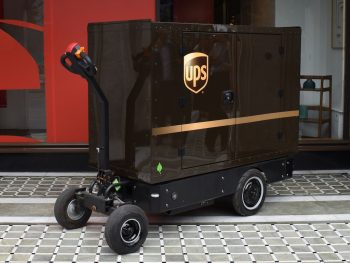A new trial to assess how walking freight can reduce emissions and congestion is underway in Fitzrovia in the London borough of Camden.

It’s being conducted by UPS and Cross River Partnership (CRP), a non-profit and impartial partnership organisation, and uses foot-based couriers to deliver packages to local residents and businesses with the help of electric-assisted trolleys developed by Fernhay.
It’s the first time that UPS has run such a trial on public land. According to research carried out by CRP in June 2022, using ‘e-walkers’ to carry out deliveries could bring economic benefits worth at least £37m per year, through decongestion, decarbonisation, improved air quality, minimise noise pollution and reduced road wear.
The trial, also being carried out with the Fitzrovia Partnership, London Borough of Camden and Heal’s, is being run to prove walking freight as a model and encourage more logistics operators to look into walking freight feasibility.
Artur Drenk, international sustainability director at UPS, said: “We are continuing to expand our alternative fuel fleet as we work towards reducing emissions per package. We are excited to introduce the electric-assisted walkers, developed by Fernhay, to the streets of Fitzrovia as part of our efforts to serve our customers in urban areas in a more sustainable way.”
Mick Atkinson, head of environment and place at the Fitzrovia Partnership, said: “The demand for next-day deliveries is now a part of life and programmes that reduce the environmental impact of the cost of doing business are fully supported by the Fitzrovia Partnership and its business community. This exciting initiative changes the nature of deliveries to minimise their impact on the environment by reducing congestion and emissions on Fitzrovia’s streets.”
The trial started early May 2023 and runs until September 2024.
Earlier this month, DPD announced that it’s expanding its work in autonomous robot deliveries. Successfully trialled in Milton Keynes, the robots will be rolled out to 10 UK towns and cities over the next year, providing a sustainable, autonomous final-mile solution as an alternative to traditional delivery vans.

